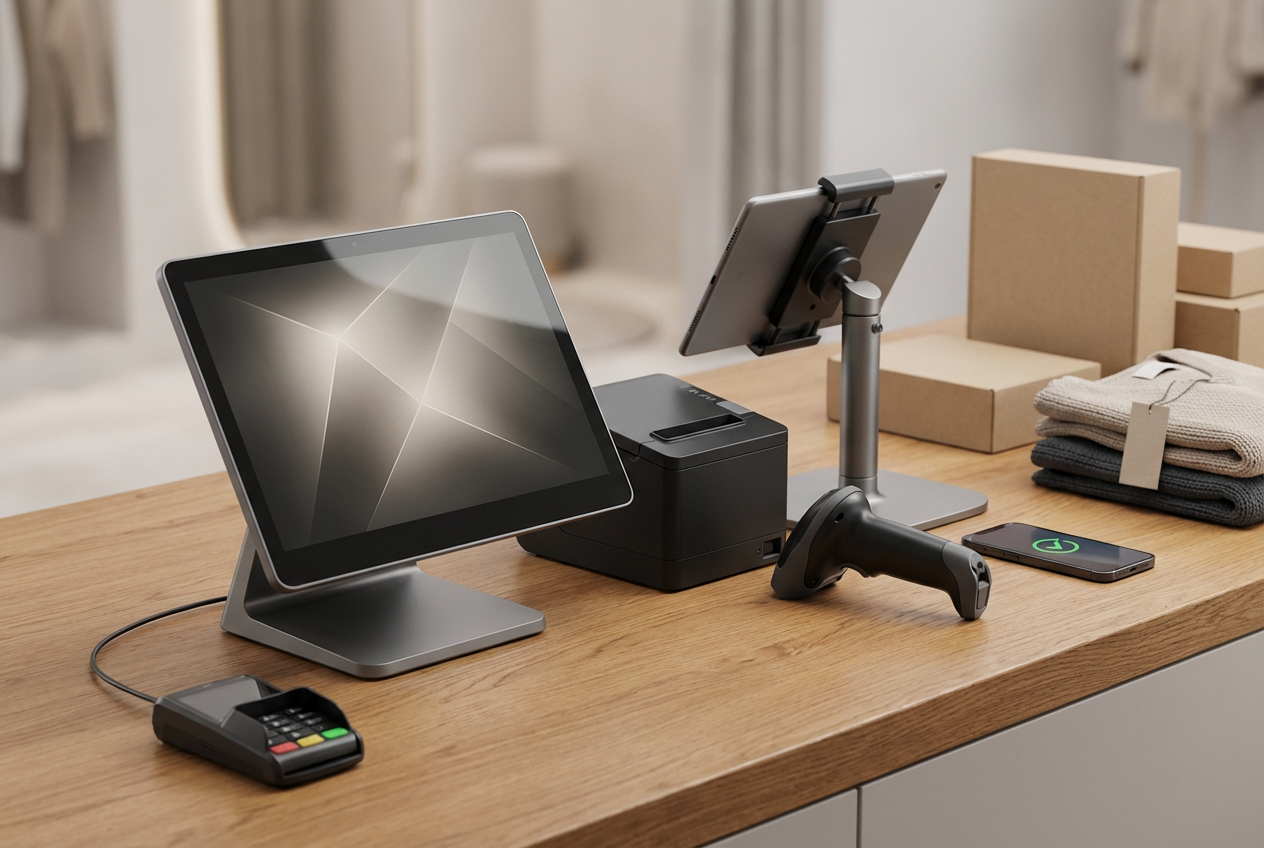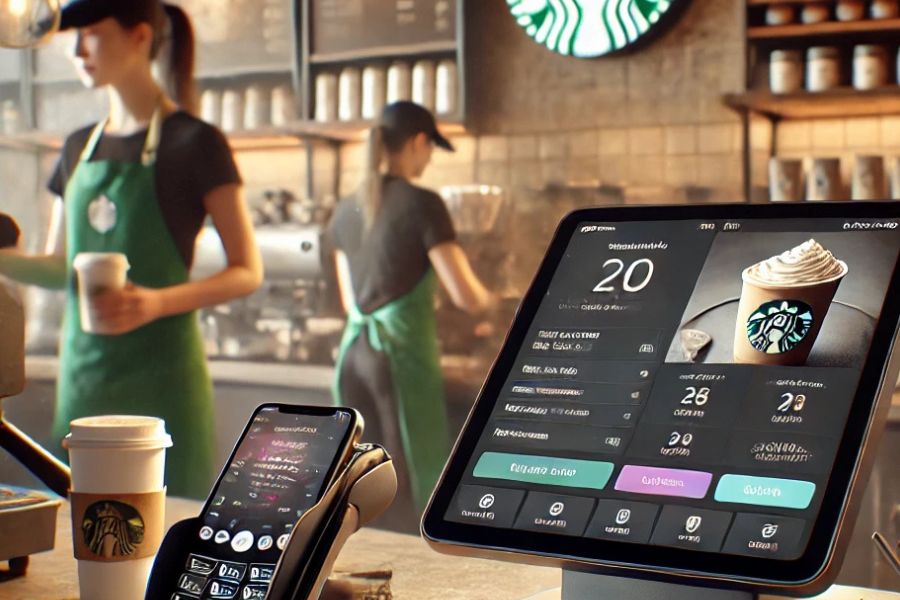In today’s fast-paced digital marketplace, running a store without a robust eCommerce POS system is like navigating a ship without a compass. Managing inventory, streamlining operations, and delivering seamless customer experiences can feel overwhelming with outdated or manual processes. But here’s the good news: implementing a POS system designed for eCommerce doesn’t just solve these challenges, it transforms your business into a well-oiled machine primed for growth.
Ready to uncover the game-changing benefits and why your store needs a POS system ecommerce? Let’s dive in and explore!
Highlight:
- Modern retail demands seamless integration of online and offline channels, real-time inventory management, and personalized customer experiences to stay competitive in a rapidly changing market.
- A POS e-commerce system helps businesses streamline operations, manage inventory efficiently, and provide a consistent, engaging experience across all sales channels.
The Evolution of Retail Technology
Retail technology’s evolution has transformed how businesses operate, from traditional brick-and-mortar stores to the modern omnichannel retail experience.
The Beginnings: Early Retail Tools
The origins of retail technology trace back to the mechanical cash register, patented by James Ritty in 1879, which transformed transaction tracking and revenue security. By the early 20th century, electric cash registers took over, offering more efficient workflows.
The 1970s brought another breakthrough with barcodes and scanners. The introduction of Universal Product Codes (UPCs) made inventory management more precise and sped up checkout lines, setting the stage for modern retail technology.
The Digital Revolution: POS Systems and E-Commerce
The 1980s and 1990s marked the emergence of POS systems that integrated hardware and software to streamline sales, inventory, and customer data management. These systems replaced manual record-keeping, offering real-time inventory tracking and sales insights.
The late 1990s saw e-commerce take center stage, with companies like Amazon and eBay reshaping shopping habits. Retailers began creating online storefronts, reaching larger audiences and integrating digital payment solutions to cater to evolving consumer preferences.
The Omnichannel Era: Bridging Online and Offline
By the 2010s, omnichannel retail transformed the shopping experience. Businesses adopted mobile apps, click-and-collect services, and social media commerce to engage customers across multiple platforms.
Technologies like RFID improved inventory accuracy, while mobile wallets and contactless payments became staples of convenience. Retailers bridged the gap between online and offline to offer cohesive shopping journeys.
The Present and Future: AI, Automation, and Beyond
Retail today is defined by cutting-edge tools. AI and machine learning personalize customer interactions, predict trends, and optimize stock levels. Chatbots provide round-the-clock customer service, while automation refines supply chain processes.
►►► Optimal solution set for businesses: Multi store POS, Next-gen POS, Inventory Management Software (MSI), Self Service, Automation, Backorders
AR and VR introduce immersive shopping experiences, such as virtual try-ons, while blockchain enhances supply chain transparency and security. The IoT is revolutionizing retail further with smart shelves and connected devices offering real-time updates.
Looking forward, sustainable technologies are becoming priorities as retailers work to reduce their environmental impact while staying ahead in innovation.
7 Reasons Your Store Needs A POS System for Ecommerce
Without a capable POS ecommerce system, managing inventory, ensuring smooth workflows, and meeting customer expectations becomes a daunting task. There are quite some reasons a modern POS solution is a standard for your business.
Centralized Inventory Management
Managing inventory across multiple channels can be a logistical nightmare for ecommerce businesses. A POS system centralizes this process, ensuring product data, pricing, and stock levels remain consistent between online and offline stores.
ConnectPOS takes this a step further by offering real-time inventory updates, minimizing stockouts and overstocking during high-demand periods like Black Friday or seasonal sales.
With 63% of retailers citing inventory mismanagement as a significant challenge (RetailDive), this feature is indispensable for maintaining accurate stock levels and improving operational efficiency.
Improved Customer Experience and Loyalty
Customer loyalty hinges on delivering personalized, seamless experiences. A modern POS system allows businesses to track purchase histories and preferences, enabling tailored interactions that boost customer satisfaction.
For example, using a POS system, you can notify frequent buyers about discounts on their favorite items, creating a personalized shopping journey that fosters loyalty. Features like integrated loyalty programs and faster checkouts also ensure customers return for repeat purchases.
Real-Time Synchronization
A POS system ecommerce ensures real-time synchronization between your online and offline sales channels, reducing errors and improving operational efficiency.
Imagine launching a flash sale on your ecommerce site. A POS system immediately reflects the updated prices and stock levels across all channels, ensuring customers have accurate information regardless of where they shop.
Research from Aberdeen Group shows that omnichannel retailers using real-time synchronization achieve 91% higher year-over-year customer retention rates compared to those that don’t.
Advanced Reporting and Data Analytics
Comprehensive data insights are vital for making informed business decisions. POS systems generate detailed reports on sales trends, customer behavior, and employee performance, helping businesses refine their strategies.
A coffee shop can use ConnectPOS’s analytics to identify peak hours and best-selling items. This data helps optimize staffing and inventory, ultimately boosting profitability. Similarly, an ecommerce store can track seasonal trends to prepare for high-demand periods
Optimized Cash Flow Control
Managing cash flow across various payment methods can be complex, but a POS system provides clarity by tracking sales, expenses, and refunds.
A fashion retailer can use a POS system like ConnectPOS to monitor daily revenue, identify slow-moving products, and adjust pricing strategies accordingly. This proactive approach helps improve cash flow and ensures financial stability.
A report by PwC highlights that businesses using automated cash flow management tools are 50% less likely to face liquidity crises, making POS systems invaluable for financial planning
Strengthened Security Measures
Data security is a top concern for ecommerce businesses, and POS system ecommerce come equipped with advanced features to safeguard sensitive information.
POS systems use encryption, tokenization, and multi-factor authentication to protect customer data, such as credit card information. Also, access can be restricted based on employee roles, minimizing internal fraud risks.
Support for Scalability
As your ecommerce business grows, a POS system ecommerce ensures your operations can scale seamlessly. Whether you’re adding new products, sales channels, or store locations, a scalable POS system adapts to your needs.
Suppose your ecommerce store expands internationally or includes pop-up shops. A scalable POS system can handle different currencies, taxes, and shipping logistics, simplifying the expansion process.
ConnectPOS simplifies ecommerce operations with tools designed to meet the needs of growing businesses. Its features include multi-location inventory management, flexible payment solutions, and smooth integration between online and in-store operations. With real-time sales insights, customizable analytics, and multi-currency support, businesses can enhance both local and global workflows. ConnectPOS is crafted to adapt to evolving retail demands, offering the resources you need to improve efficiency and deliver a better shopping experience.
Challenges When Selling Online without a POS
Selling online without a POS system can present several challenges that hinder the growth and efficiency of your business. One major issue is inventory management. Without a POS system, it becomes difficult to track stock levels in real time, leading to overselling or stockouts. This can result in frustrated customers and missed sales opportunities.
Another challenge is order processing. Manually handling orders from multiple channels can lead to errors, delays, and missed shipments, affecting customer satisfaction. Additionally, financial reporting can become cumbersome. Without a POS, consolidating sales data across different platforms for accounting purposes can be time-consuming and prone to mistakes.
Customer experience can also suffer. Without automated data collection, offering personalized recommendations or loyalty rewards becomes challenging, potentially leading to lost repeat business.
A reliable POS system streamlines inventory management, order processing, and financial reporting, helping businesses avoid these challenges and improve operational efficiency.
FAQs: POS System Ecommerce
- Can a POS Ecommerce system help with inventory management?
Yes, a POS Ecommerce system tracks stock levels in real time, ensuring accurate inventory management across multiple channels.
- Is a POS Ecommerce system secure?
Yes, modern POS Ecommerce systems use encryption, secure payment gateways, and regular updates to ensure data security and protect customer information.
- Can I integrate a POS Ecommerce system with other business tools?
Yes, most POS Ecommerce systems integrate seamlessly with tools like accounting software, CRM, and marketing platforms for streamlined operations.
Conclusion
In sum, a POS system ecommerce is no longer a luxury but a necessity for businesses looking to stay competitive in the fast-paced digital marketplace. Streamlined inventory management to enhanced customer experiences and robust security measures, the benefits of implementing an eCommerce POS system are undeniable.
Let’s adopt a reliable solution like ConnectPOS, you can improve operational efficiency, scale your business seamlessly, and ultimately drive growth. Contact us today to explore how our POS system for eCommerce can transform your business.
►►► Optimal solution set for businesses: Shopify POS, Magento POS, BigCommerce POS, WooCommerce POS, NetSuite POS, E-Commerce POS



